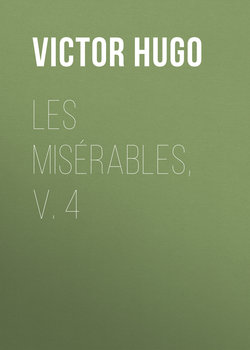Читать книгу Les Misérables, v. 4 - Victor Hugo, Clara Inés Bravo Villarreal - Страница 12
BOOK III
THE HOUSE OF THE RUE PLUMET
CHAPTER II
JEAN VALJEAN A NATIONAL GUARD
ОглавлениеProperly speaking, however, Jean Valjean's house was at the Rue Plumet, and he had arranged his existence there in the following fashion: Cosette and the servant occupied the pavilion, she had the best bedroom, with the painted press, the boudoir with the gilt beading, the president's drawing-room with its hangings and vast easy chairs, and the garden. Jean Valjean placed in Cosette's room a bed with a canopy of old damask in three colors, and an old and handsome Persian carpet, purchased at Mother Gaucher's in the Rue Figuier St. Paul; while, to correct the sternness of these old splendors, he added all the light gay furniture of girls, an étagère, bookshelves with gilt books, a desk and blotting-case, a work-table inlaid with mother-of-pearl, a silver dressing-case, and toilet articles of Japanese porcelain. Long damask curtains of three colors, like those on the bed, festooned the first-floor windows, while on the ground-floor they were of tapestry. All through the winter Cosette's small house was warmed from top to bottom, while Jean Valjean himself lived in the sort of porter's lodge at the end of the back yard, which was furnished with a mattress and common bedstead, a deal table, two straw-bottomed chairs, an earthenware water-jug, a few books on a plank, and his dear valise in a corner, but he never had any fire. He dined with Cosette, and black bread was put on the table for him; and he had said to Toussaint, when she came, "This young lady is mistress of the house." "And you, sir?" Toussaint replied, quite stupefied. "Oh! I am much better than the master, – I am the father."
Cosette had been taught house-keeping in the convent, and checked the expenses, which were very small. Daily Jean Valjean took Cosette for a walk, leading to the most sequestered path of the Luxembourg, and every Sunday they attended Mass at the Church of St. Jacques du Haut-pas, because it was a long distance off. As it is a very poor district, he gave away a considerable amount of alms, and the wretched flocked around him in the church, which produced the letter from Thénardier, "To the Benevolent Gentleman of the Church of St. Jacques du Haut-pas." He was fond of taking Cosette to visit the indigent and the sick, but no stranger ever entered the house in the Rue Plumet. Toussaint bought the provision, and Jean Valjean himself fetched the water from a fountain close by, on the boulevard. The wood and wine were kept in a semi-subterranean building covered with rock-work, near the door in the Rue de Babylone, which had formerly served the president as a grotto, for in the age of Follies and Petites Maisons, love was not possible without a grotto. In the door opening on the Rue de Babylone there was a letter-box, but, as the inhabitants of the house in the Rue Plumet received no letters, this box, once on a time the go-between in amourettes, and the confidant of a love-sick lawyer, was now only of service to receive the tax-papers and the guard-notices. For M. Fauchelevent, annuitant, belonged to the National Guard, and had been unable to escape the close meshes of the census of 1831. The municipal inquiries made at that period extended even to the convent of the Little Picpus, whence Jean Valjean emerged venerable in the eyes of the mayoralty, and consequently worthy of mounting guard. Three or four times a year Jean Valjean donned his uniform and went on duty, and did so readily enough, for it was a disguise which enabled him to mix with everybody, while himself remaining solitary. Jean Valjean had attained his sixtieth year, or the age of legal exemption; but he did not look more than fifty; besides, he had no wish to escape his sergeant-major and cheat Count Lobau. He had no civil status, hid his name, his identity, his age, everything, and, as we just said, he was a willing National Guard, – all his ambition was to resemble the first-comer who pays taxes. The ideal of this man was internally an angel, externally a bourgeois.
Let us mention one fact, by the way. When Jean Valjean went out with Cosette he dressed himself in the way we have seen, and looked like a retired officer; but when he went out alone, and he did so usually at night, he was attired in a workman's jacket and trousers, and a cap whose peak was pulled deep over his eyes. Was this precaution or humility? Both at once. Cosette was accustomed to the enigmatical side of her destiny, and hardly noticed her father's singularities; as for Toussaint, she revered Jean Valjean, and considered everything he did right. One day her butcher, who got a glimpse of her master, said, "He's a queer looking stick," and she replied, "He's a – a – a – saint." All three never left the house except by the gate in the Rue de Babylone; and unless they were noticed through the garden gate it would be difficult to guess that they lived in the Rue Plumet. This gate was always locked, and Jean Valjean left the garden untended that it might not be noticed. In this, perhaps, he deceived himself.
